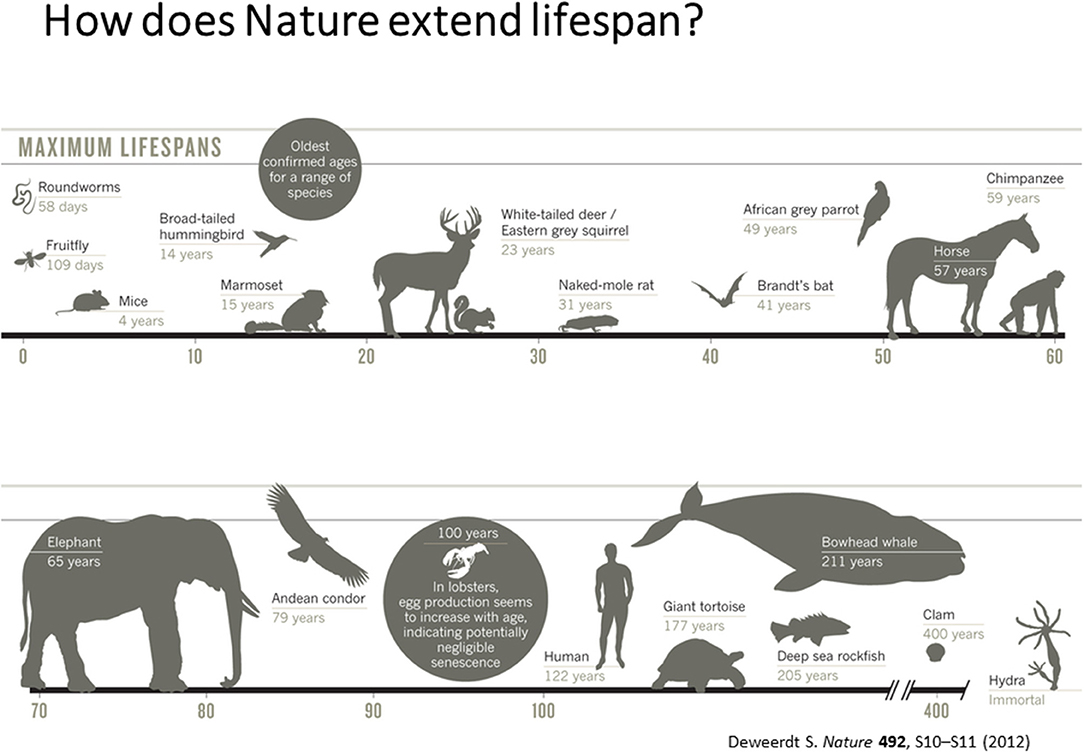Artificial Intelligence Based Approaches to Identify Molecular Determinants of Exceptional Health and Life Span-An Interdisciplinary Workshop at the National Institute on Aging

Maximum Life Span across different species [adapted from Deweerdt (2012), Copyright received from Nature Journal].
Artificial intelligence (AI) has emerged as a powerful approach for integrated analysis of the rapidly growing volume of multi-omics data, including many research and clinical tasks such as prediction of disease risk and identification of potential therapeutic targets. However, the potential for AI to facilitate the identification of factors contributing to human exceptional health and life span and their translation into novel interventions for enhancing health and life span has not yet been realized. As researchers on aging acquire large scale data both in human cohorts and model organisms, emerging opportunities exist for the application of AI approaches to untangle the complex physiologic process(es) that modulate health and life span. It is expected that efficient and novel data mining tools that could unravel molecular mechanisms and causal pathways associated with exceptional health and life span could accelerate the discovery of novel therapeutics for healthy aging. Keeping this in mind, the National Institute on Aging (NIA) convened an interdisciplinary workshop titled “Contributions of Artificial Intelligence to Research on Determinants and Modulation of Health Span and Life Span” in August 2018. The workshop involved experts in the fields of aging, comparative biology, cardiology, cancer, and computational science/AI who brainstormed ideas on how AI can be leveraged for the analyses of large-scale data sets from human epidemiological studies and animal/model organisms to close the current knowledge gaps in processes that drive exceptional life and health span. This report summarizes the discussions and recommendations from the workshop on future application of AI approaches to advance our understanding of human health and life span.
Introduction
Aging is often described as the outcome of interactions among genetic, environmental and lifestyle factors with wide variation in life and health span between and within species (Newman and Murabito, 2013; Partridge et al., 2018; Singh et al., 2019). Exceptional life and health span represents an extreme phenotype characterized by exceptional survival (well-beyond average life expectancy), delayed onset of age-related diseases (before 80 years of age) (Pignolo, 2019) and/or preservation of good health/function relative to their peers (Perls et al., 2000, 2002; Kaeberlein, 2018). The identification of SNP associations with exceptional life and health span is a starting point for identifying targets for interventions that could potentially promote healthy human aging. In this context, understanding the functional effects of human genetic variants and cellular factors associated with exceptional survival can identify potential targets for interventions to mimic their favorable effects (Kennedy, 2008; Kaeberlein and Kennedy, 2009). The advent of high-throughput technologies is enabling the acquisition of large data sets on genetics, genomics and many cell variables, including proteins, lipids and metabolites in an effort to (1) untangle the intricate biological process of aging, (2) identify drug targets, and (3) develop therapeutics to enhance life and health span. Individually these datasets have contributed to our understanding of human physiology and diseases but existing approaches fall short in terms of understanding the complex role of those mechanisms in aging that protect individuals from age-related diseases and enable health and life span (Sebastiani et al., 2013, 2017a; Milman and Barzilai, 2015). The application of GWAS, Mendelian randomization and other similar approaches have been of limited success and have not resulted in any major breakthroughs in therapeutics for prevention of age-related diseases, including Alzheimer's Disease (AD).
Alternative strategies which could be more fruitful include integrated analysis of multi-omics data and comparative biology approaches. For example, exceptional life and health span involve a multiplicity of interacting contributory factors and the nature of these interactions can change with time. There is a need to unlock ......
T H E R E S T A T T H E S O U R C E : Frontiers in Artificial Intelligence
Edited by Engadin, 11 August 2019 - 04:58 PM.











































